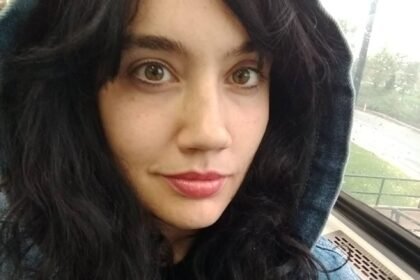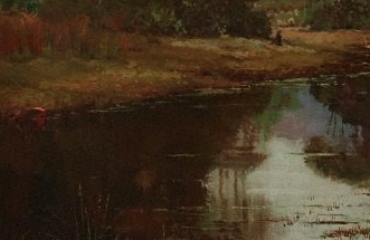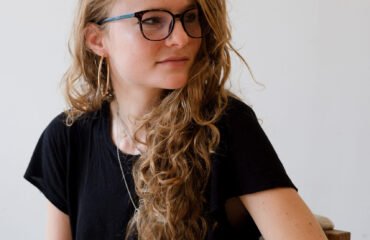GIFTS by Samantha Neugebauer

Marie and Ms. Simpkin’s unexpected meeting on the park’s northwest corner got their lunch off to a bad start. Neither felt quite ready to commit themselves to conversation, yet what else could they do? They would need to proceed around the gated park and down Irving Place together as if the ten minutes of solitude they’d lost had been no loss at all.
Walking side by side, each suspected the other’s inner disappointment, though neither could right it, and the more questions they posed to one another, the more each mourned their solitary stroll and the things they would have seen and pondered on their own. In the body, disappointment, the quotidian sort, wedged firmly between tension and imagination, the only paths outward. Taking shorter steps than she was accustomed to taking, Marie fixed her gaze on the old woman’s plump, jaundiced hand clutching an ornate snakehead cane; its one eye a bright costume sapphire, the other, a tarnished cavity.
Ms. Simpkin had been Marie’s professor in her first-year writing seminar, The Palace Versailles, the previous spring. On the first day of class, Ms. Simpkin had arrived late, out of breath, large, and mummified in a floral, gauzy scarf. Their class had met in a tight, square, windowless room in the library, the walls the color of a hearing-aid, and the first thing Ms. Simpkin had uttered was that if a shooter came in, they’d all be killed. “You should demand more for your money—or your parents’ money,” she’d told them with a wicked chuckle.
Now it was late June, and Marie could barely recall how exactly the lunch had come about. She must have arranged it near the end of the term. She must have approached Ms. Simpkin after class and, in a surge of daring and career-mindedness, encouraged a further meeting. But had Ms. Simpkin suggested a meal off campus and the particular date? Marie could not recall any kind of back and forth. She felt funny about it, and all summer, she’d jailed the lunch inside a thick blue circle within her calendar notebook so that she could forget about it until the time came.
Circumstances forced Marie to be a meticulous calendar user. She had three part-time jobs and an active social life. The previous night, she’d been drinking at El Cantinero with her friend Will, a screenwriting major. For a few months, Will had been crushing on the handsome older man who tended bar there, and though it was beyond Will’s current powers to draw the bartender’s interest, Marie and Will made a game of studying the bartender’s words and mannerisms for signs of hidden affection. For her services, Will bought Marie as many Blue Hawaiians as she wanted. It was 2009, Marie was nineteen, and Blue Hawaiians were the only drink she was sure she liked. She drank five that night, as well as three large glasses of water, and she and Will were the last people to leave the bar at four in the morning.
And in three hours, after her lunch with Ms. Simpkin, Marie would need to report to her dorm for her overnight R.A. shift, where in exchange for summer housing and ten meals a week, she served in an on-call rotation, minding the other students staying in New York over the summer completing unpaid internships and taking extra classes. The position also required Marie to work thirty hours a week at the university housing office. In addition, she cashiered fifteen hours at the Union Square Barnes and Noble and babysat for a Tribeca family on Saturday afternoons and Tuesday nights. Although Marie considered the babysitting the least impressive of her jobs, she enjoyed it most. It got her out into the city and into an interesting lofted apartment—her possible future!—and the two little girls weren’t the spoiled monsters Marie’s mother had told her to expect.
*
Daria had seen something in Marie, a little talent, but now whatever she’d seen did not seem enough to warrant this outing. A haze of pity, directed at Daria (!), floated on the edges of the large-chested girl, who was chattering gently about her sibling structure back home in “Delco.” Marie was the eldest apparently, and Marie thought this meant something, although she faltered at saying so directly because, Daria intuited, Marie didn’t know what it meant, and staying one step away from the meaning allowed the meaning to be more mysterious. If the girl wanted to be a writer, she’d need to overcome that. They waited for the light. Daria checked the clasp on her dark floral carpetbag. “What about you?” Marie asked. “Do you have siblings?”
“Siblings?” Daria hollered. “Yes, yes. Two brothers and a sister.” To be kind, she added, “I’m the eldest.”
Marie smiled knowingly, knowing nothing. Not for the first time Daria scolded herself—she could not continue to use her heart to make all her decisions.
Daria was sixty-four, a contract faculty, and lived in a one-bedroom apartment in Brooklyn. She had moved to New York in 1965. Initially, she’d worked as a magazine copy editor while earning her master’s. She stayed and stayed, working and working and writing novels that never sold. In her chic way, she’d scorned marriage, children, and large single houses. She’d seen so much! So much!
A whoosh from a too-close bike startled them both, and too soon, Marie asked, “Do you have any animals?” wearing an indulgent smile, and Daria wanted to whack the girl with her cane.
*
Inside the tavern, they were seated in a tall booth in a far, dark corner where Ms. Simpkin immediately ordered a burger deluxe and an unsweetened ice tea, and Marie said she would have the same as her friend. Her friend—Marie had known the phrase had been the wrong choice as it was leaving her mouth, and she kicked her inner self for saying it. She had become more nervous since sitting down, and she found only a smidgen of relief in that Ms. Simpkin seemed too preoccupied sighing and arranging her large handbag on the booth cushion to notice what Marie had said.
Middle-aged men in pale blue dress shirts, the sort of men who looked to Marie as if they ran before work, filled the tavern’s tables. They ate easily and spoke assertively to one another like they had all the time in the world. Opposite Marie and Ms. Simpkin was an enormous black-and-white portrait of O. Henry, his handlebar mustache as long as Marie’s plastic straw. Marie felt glad to see the portrait; she would use it as a conduit to bring up the writer, as Will had advised her to do at El Cantinero. Will had been a student in The Palace Versailles too. He was from Connecticut and his parents worked “in the city,” so he knew that O. Henry had written his short story “The Gift of the Magi” at this very tavern.
Will had also said that if he were Marie, he’d cancel with Ms. Simpkin. “Agreeing to it was a moment of temporary insanity,” he explained to her. “You’ll never see Ms. Simpkin again anyway. Thank god. It really doesn’t matter! Just email her and say you’re sick and come back to my apartment and have a sleepover with me.” For reasons she hadn’t quite worked out yet, Will’s insistence that the meeting “didn’t matter” irritated Marie.
Marie had stopped by The Strand bookstore that morning to read “The Gift of the Magi.” She chose The Strand because she felt clumsy inside the Barnes and Noble when she wasn’t working. She had not felt that way before she’d worked there. In the same way, she avoided certain streets in Tribeca when she wasn’t scheduled to babysit.
*
They were discussing Michael Jackson, who’d died the previous day. Ms. Simpkin took the top bun off her burger and tucked it inside her napkin, then proceeded to cut and eat her burger like a steak. “Michael adored Versailles,” Ms. Simpkin said.
When Marie mentioned the pop king’s child abuse allegations, their budding conversation immediately deflated. Ms. Simpkin sighed with gloomy concern.
To Marie, the teacher seemed equally irritated by her bringing up Jackson’s errors as she was by the errors themselves. Fazed, Marie gestured feebly to O. Henry’s portrait, hoping to redeem herself. She told Ms. Simpkin that she liked the line in “The Gift of the Magi” about the tiny mirror hanging in the couple’s apartment, and quoted: “A person could see only a little of himself at a time.” Daria, pleased and touched by the girl’s preparatory instincts, responded kindly. Daria felt better about making time for the lunch—she would bestow upon the girl some valuable advice after all.
After a final bite of dry patty, she said, “I’ll be frank with you, Marie. If you truly want to write, you should leave New York. Keep your overhead low.” Marie dipped her fry in ketchup, smiling and nodding politely.
“You don’t believe me. But a girl like you won’t be able to do both. You think your thoughts and your feelings are unique, but they’re not, especially here, and what will happen is your peers with more means will get those thoughts and feelings down before you.”
Marie’s eyes froze blankly. Her ears felt stuffed with cotton.
Daria continued, “Then more girls will come, younger and younger than you, and your experiences will feel older and smaller and more overdone.”
*
Later, on the train home, Daria forgot nearly everything about the lunch except her own magnanimity and the girl’s tepid responses, especially during the latter half of their meal when Daria had given the girl some tough love. Marie, Daria contemplated, might not have been ready to be given such sincerity, but Daria felt no remorse: her gift would remain inside Marie and deny her the delusion that nobody had warned her. With a sense of calm and self-satisfaction, and feeling that twinkle of purpose that never lasted long enough, she folded her hands over the carpetbag perched on her lap and enjoyed the skyline view as the train crossed the East River.
Meanwhile, strolling down Broadway back to her dorm, Marie checked her phone. Will had already texted four times:
How’d it go???
I can’t get out of bed
Could I still be drunk??
Tell me everythinggg
Marie’s first instinct was to call Will right then and tell him about the unfortunateness of the impromptu meeting beside Gramercy Park and the long, dragging walk, and the almost-getting-hit by the bicycle, and the prettiness of the tavern’s tin roof, and a few of Ms. Simpkin’s odd comments about this and that. But when her mind reached the part where Ms. Simpkin gave her the writing life advice—the part that would be of most interest to Will too, she supposed—a mixture of protectiveness and self-consciousness strained her. She could, she thought, share what Ms. Simpkin had said, leaving out its specific application to Marie’s own situation.
Marie veered to the side of the sidewalk and leaned against a brick wall between two shops. People appeared, disappeared. Buses, shouts, small and large dogs. Long columns of gold light reposed in charming delicacy across the building ahead. Marie felt significant in this atmosphere of significance. She fell into a premonition of Will’s reaction to Ms. Simpkin’s advice. She heard his blithe laugh, his oh-my-god-no, and then, his voice becoming a little more serious as he actually considered what their former teacher had said. Will could be serious when he wanted to be.
He would say something like, “She might be onto something,” then quickly dismiss it again because he could, because he could “never leave New York,” and Marie would agree with him, “of course.” Marie leaned forward; the rough brick was scratching her neck and the backs of her shoulders. A small woman with an enormous Saint Bernard climbed the steps of a townhouse on the street parallel. Once she and her canine were inside her door, Marie imagined what else she might say to Will. Perhaps: “Promise me I’m not going to end up like Ms. Simpkin!” and Will would assure her, no, no way, never, and Marie started forward, feeling their harmony lifting her and levitating her heart into her eyes so they shone like that charming light as she strode ahead. One saw these young women all the time—coming, going, the knowing far back behind their eyes, then rushing forward at unexpected intervals, like a cool draft entering a house, dropping the temperature before departing again in some mysterious way.

